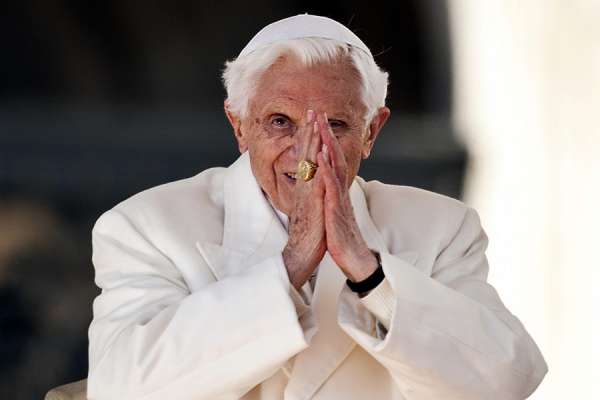In the new biography, Benedict XVI complains about the modern "anti-Christian creed"

Modern society is formulating an "anti-Christian creed" and punishing those who resist it with "social excommunication", said Benedict XVI in a new biography, published in Germany on May 4.
In a wide-ranging interview at the end of the 1.184-page book written by the German author Peter Seewald, the pope emeritus said that the greatest threat to the Church was a "world dictatorship of apparently humanistic ideologies".
Benedict XVI, who resigned as pope in 2013, made the comment in response to a question about what it meant at his inauguration in 2005, when he urged Catholics to pray for him "so that I cannot escape for fear of the wolves. "
He told Seewald that he was not referring to matters within the Church, such as the "Vatileaks" scandal, which led to the conviction of his personal butler, Paolo Gabriele, for stealing confidential Vatican documents.
In an advanced copy of "Benedikt XVI - Ein Leben" (A Life), seen by CNA, the pope emeritus said: "Of course, issues such as" Vatileaks "are maddening and, above all, incomprehensible and highly disturbing for people in the world in general. "
"But the real threat to the Church and therefore to the ministry of St. Peter does not consist in these things, but in the worldwide dictatorship of apparently humanistic ideologies and contradicting them constitutes exclusion from the basic social consensus".
He continued: “One hundred years ago, everyone would have thought it was absurd to talk about same-sex marriage. Today those who oppose are socially excommunicated. The same goes for abortion and the production of humans in the laboratory. "
"Modern society is developing an" anti-Christian creed "and resisting is punishable by social excommunication. The fear of this spiritual power of the Antichrist is therefore all too natural and it really takes the prayers of an entire diocese and of the universal Church to resist ”.
The biography, published by the Munich-based publisher Droemer Knaur, is only available in German. An English translation, "Benedict XVI, The Biography: Volume One", will be published in the United States on November 17.
In the interview, the 93-year-old former pope confirmed that he had written a spiritual testament, which could be published after his death, as well as Pope St. John Paul II.
Benedict said he followed the cause of John Paul II quickly because of the "evident desire of the faithful", as well as the example of the Polish pope, with whom he had worked closely for over two decades in Rome.
He insisted that his resignation had "absolutely nothing" to do with the episode involving Paolo Gabriele and explained that his 2010 visit to the tomb of Celestine V, the last pope to resign before Benedict XVI , it was "quite a coincidence". He also defended the title of "emeritus" for a retired pope.
Benedict XVI lamented the reaction to his various public comments after his resignation, citing criticisms of his tribute read to Cardinal Joachim Meisner's funeral in 2017, in which he said that God would prevent the capsizing of the church ship. He explained that his words were "taken almost literally from the sermons of San Gregorio Magno".
Seewald asked the pope emeritus to comment on the "dubia" presented by four cardinals, including Cardinal Meisner, to Pope Francis in 2016 regarding the interpretation of his apostolic exhortation Amoris laetitia.
Benedict said he didn't want to comment directly, but he referred to his latest general public on February 27, 2013.
Summarizing his message that day, he said: "In the Church, among all the labors of humanity and the confused power of the evil spirit, you will always be able to discern the subtle power of God's goodness."
"But the darkness of the subsequent historical periods will never allow the pure joy of being a Christian ... There are always moments in the Church and in the life of the individual Christian in which he deeply feels that the Lord loves us and this love is joy, it is" happiness". "
Benedetto said he treasured the memory of his first meeting with the newly elected Pope Francis in Castel Gandolfo and that his personal friendship with his successor continued to grow.
Author Peter Seewald conducted four book length interviews with Benedict XVI. The first, "Salt of the Earth", was published in 1997, when the future pope was prefect of the Vatican Congregation for the Doctrine of the Faith. It was followed by "God and the World" in 2002 and "Light of the World" in 2010.
In 2016 Seewald published "Last Testament", in which Benedict XVI reflected on his decision to resign as pope.
Publisher Droemer Knaur said that Seewald spent many hours talking to Benedict about the new book, as well as talking to his brother, Msgr. Georg Ratzinger and his personal secretary, Archbishop Georg Gänswein.
In an interview with Die Tagespost on April 30, Seewald claimed to have shown chapters of the book to the pope emeritus before publication. Benedict XVI, he added, praised the chapter on the encyclical Mit brennender Sorge of Pope Pius XI of 1937